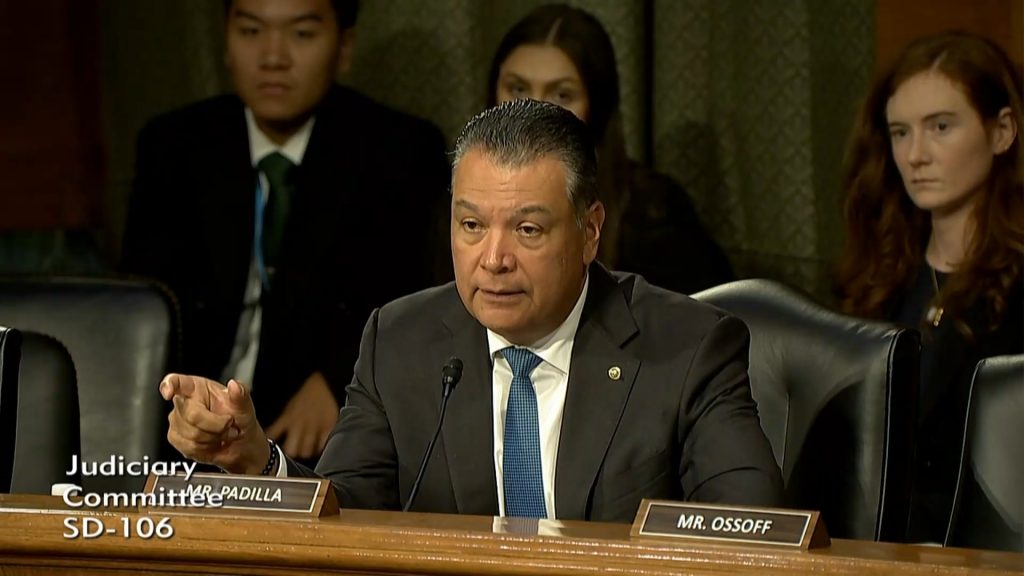WATCH: Padilla Denounces SCOTUS Presidential Immunity Ruling During Senate Judiciary Committee Hearing

WASHINGTON, D.C. — Today, U.S. Senator Alex Padilla (D-Calif.), a member of the Senate Judiciary Committee (SJC), joined a hearing titled “‘When the President Does It, that Means It’s Not Illegal’: The Supreme Court’s Unprecedented Immunity Decision,” to question witnesses on the Supreme Court’s dangerous ruling in Trump v. United States that now grants former presidents — including Donald Trump — criminal immunity for a wide range of activities taken while in office.
Padilla sharply rebuked the decision, underscoring the Supreme Court’s upending of centuries of history and tradition that presidents can be held accountable for crimes committed while in office. He criticized the Court for inventing a new form of presidential criminal immunity and for declining to designate a single action that Donald Trump took in the lead-up to the January 6th riot at the Capitol as “unofficial.”
Padilla asked Professor Mary B. McCord, Executive Director of the Institute for Constitutional Advocacy and Protection at Georgetown University Law School, about dangerous potential scenarios that could exploit this immunity ruling, including a president ordering the Department of Justice to stop investigating their family for criminal conduct or directing the military to attack a political rival.
Key Excerpts:
PADILLA: Let’s be clear, the court’s decision to effectively let Trump off the hook has already caused devastating harm for our country, especially to voters and election workers. Trump has essentially been given a pass for weaponizing the Department of Justice to bully states into drumming up false election fraud charges for his attempts to pressure Vice President Pence into helping him steal the election and for inciting a violent mob to storm the Capitol on January 6.
[…]
PADILLA: I want to ask a few simple yes or no questions about hypothetical, but not farfetched scenarios. If a future President were to order the Department of Justice to cease investigating their spouse, their child, or themselves for alleged criminal conduct, would that be an official act?
PROFESSOR MCCORD: It would appear that under the court’s ruling, yes, that would be immune. Actually, even more than official act as core constitutional powers.
PADILLA: Because the president directs the executive branch. Scenario number two: if a future President were to direct the Armed Services to attack the home of a political rival, would that be an official act?
MCCORD: I think that is one of the questions the court leaves open for us, if…
PADILLA: The fact that it’s not a clear ‘no’ is the problem because the President is the Commander in Chief. Look, Mr. Chair, I can go on and on with example after example that should alarm us and the American people. But I will conclude by just acknowledging this: It’s particularly auspicious that this committee is meeting today to examine this wildly consequential and wildly unprecedented decision, 235 years to the day since the Supreme Court was established by an act of Congress. So in closing, I’ll just echo Justice Sotomayor’s powerful words. Every president in our history has governed with the understanding shared by the American people that they could be held accountable for crimes committed while in office. And with that no longer the case, I share her fear for our democracy, and I stand firmly with the spirit of her dissent.
Video footage of Senator Padilla’s full remarks is available here.
The Supreme Court issued a misguided 6-3 decision in July that “the nature of Presidential power entitles a former President to absolute immunity from criminal prosecution for actions within his conclusive and preclusive constitutional authority. And he is entitled to at least presumptive immunity from prosecution for all his official acts. There is no immunity for unofficial acts.”
The ramifications of the Supreme Court’s decision have already harmed voters and election workers. Texas Attorney General Ken Paxton’s election integrity unit recently led targeted raids of several Latino voting rights organizers, officials, and candidates on the basis of unfounded allegations of widespread voter fraud. In Florida, law enforcement has targeted individuals who signed a petition for a constitutional amendment to protect abortion rights. Across the country, there has been a surge in abusive public records requests aimed at election offices.
In the aftermath of the Supreme Court’s unprecedented decision, Senator Padilla criticized the ruling and traveled with President Biden to Austin, Texas as the President announced three proposed reforms to restore trust in, and accountability for, our judiciary, including a constitutional amendment making clear that no President is above the law or immune from criminal prosecution. Padilla also joined Senate Majority Leader Chuck Schumer (D-N.Y.) and 32 of his Democratic Senate colleagues in introducing the No Kings Act, which would reaffirm that Presidents and Vice Presidents do not have immunity for actions that violate federal criminal law and clarify that Congress, not the Supreme Court, determines to whom federal criminal laws may be applied.
###